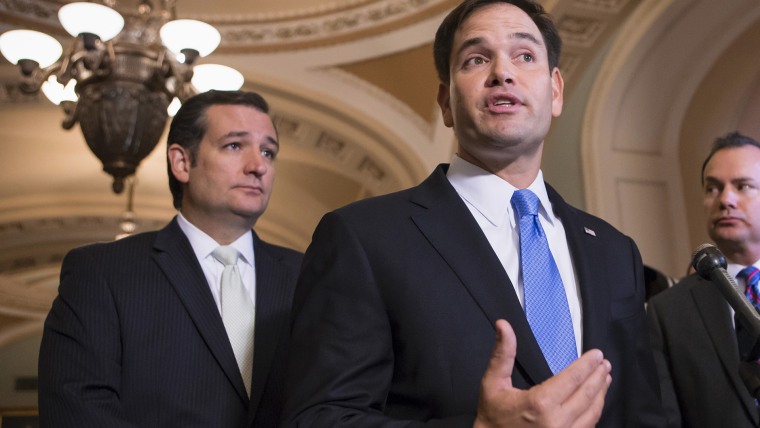Sen. Marco Rubio (R-Fla.) has been quite cautious when going on the offensive against his Republican presidential rivals, occasionally mixing it up, but almost always in response to someone else.
At this phase in the race, however, Rubio doesn't have the luxury of passivity. Despite all of the media hype, the Florida senator is not yet leading anywhere -- not even in his home state -- and he remains effectively tied with Sen. Ted Cruz (R-Texas). If he's going to break out, Rubio is going to have to overcome some of his competitors.
Keep that in mind when reading what Rubio told conservative host Hugh Hewitt yesterday.
"There are policy differences between the candidates. You know, Senator Cruz, over the last three years, is someone I like personally. We get along, and we share a lot of views. On some of the defense issues, we’ve parted ways. [...] "[H]e was a part of that coalition that worked with the Democrats like Chuck Schumer and the ACLU to harm our intelligence programs. And so Senator Cotton, and I’ve joined him today in this effort, are trying to get that reversed, so that we can have the metadata collection program reinstated for the long term so that this country does not lose a valuable tool in the war on terror."
The motivation for this couldn't be more obvious. Not only does Rubio have reason to highlight any areas of disagreement with Cruz, but with the right in a panic over Paris, Rubio also wants to remind Republicans that he supports an expansive National Security State with broad surveillance powers, while Cruz has backed limits on government authority.
The problem with Rubio's pitch, however, is that he doesn't seem to appreciate how risky it is.
For one thing, for Rubio to complain about anyone being part of a "coalition that worked with the Democrats like Chuck Schumer" is bizarre -- since Rubio himself partnered with Schumer and other Democrats in a coalition to support comprehensive immigration reform.
For another, the Florida lawmaker was referring specifically to legislation from June called the "USA Freedom Act," which curtailed federal surveillance of Americans' phone records. Rubio opposed the bill, while Cruz supported it. But the trouble is, Cruz was hardly the only one -- the bill passed the Senate with a 67-vote majority, and passed the GOP-led House, 338 to 88.
Rubio would have voters believe that Cruz was some kind of Republican In Name Only for having supported the legislation, but that same bill was backed by members of the Republican leadership in both chambers, including House Speaker Paul Ryan.
More to the point, some of the congressional Republicans who've endorsed Rubio's campaign also voted with Cruz on the so-called Freedom Act.
Is the Floridian prepared to argue that his own supporters "harmed our intelligence programs" and undermined U.S. counter-terrorism efforts, or is this entire line of attack a bad idea?
Correction: I'd originally reported that Rep. Jim Jordan (R-Ohio), the head of the House Freedom Caucus, had voted for the Freedom Act. He did not. The above text has been edited accordingly.
